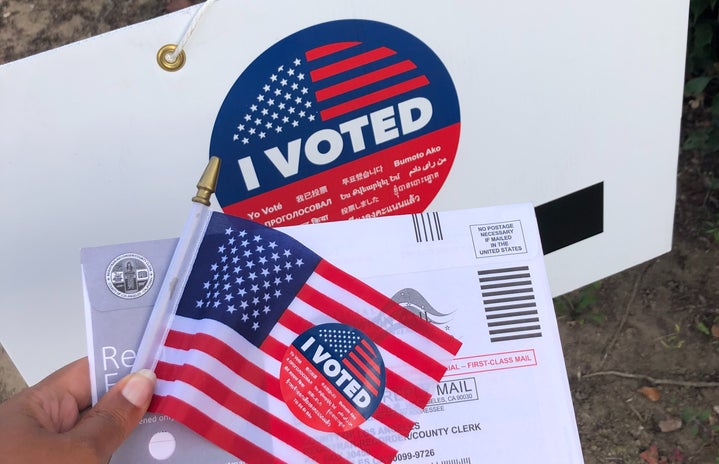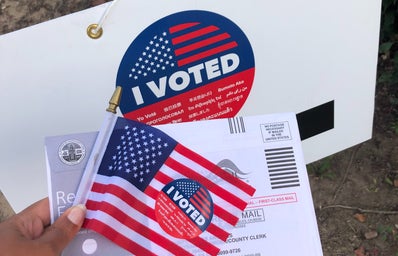The 2024 presidential election is less than one month away. The importance of voting cannot be overstated. This is a pivotal moment for our country– social justice, climate change, and serious economic considerations are on the line. Yet, it seems that now more than ever Americans across party lines are disappointed in our government and have become discouraged from voting.
Here are my thoughts on why Americans refuse to vote and why I think withholding your electoral power is not the solution to shaping a more accountable, representative government:
Common Reasons Why People Believe Their Vote Doesn’t Matter:
They Live in A State That Consistently Goes to the Other Party
A government position that is consistently served by candidates of a particular party is called a safe seat. When it comes to the presidential election, states that consistently vote for the Republican or Democrat candidate are called red and blue states respectively. This means that time after time the majority of residents in the state are voting for the same candidate/party. When this majority becomes overwhelming, it can be difficult for those belonging to the opposite party to feel like their vote matters. Why bother voting if you know your vote won’t change the outcome?
They Don’t Live in A Swing State
Because of the Electoral College system, many people believe that the only votes that matter are the ones of swing state residents. Swing states are states that could reasonably elect a Democrat or Republican candidate since there is no clear party majority among voters. Since it is almost certain that the Democrat candidate will win blue states and the Republican candidate will win the red states, presidential candidates target most of their campaigning and attention toward swing states that they need to secure the 270 electoral votes required to win the election. This tends to make voters who live in non-swing states feel like their vote won’t make a difference in the nationwide presidential election since their state’s outcome is predetermined and it’s only a select few states that hold the ultimate electoral power.
Why You Should Vote Anyway:
While these sentiments of limited individual electoral power are valid, they are also hurting our democracy. When people become discouraged from voting, voter turnout decreases and the dominance of the other party increases. This means that the political diversity of the people is not accurately reflected. If political diversity is not represented in the vote, there is no incentive for elected officials to appease the minority party. So while your vote may not change the outcome of the election, your voice still matters and should be accounted for.
The Non Voter Bloc
There is a powerful group of citizens who have the power to undermine votes in key battleground states and districts: people who don’t vote! According to NPR, in the 2020 presidential election more than 80 million Americans who were eligible to vote did not vote. In many districts/states, the number of eligible voters who did not vote outnumbers the margin of victory between candidates. Non-voters have the power to change outcomes.
Civic Responsibility and Democracy
Voting is a privilege and a responsibility. Eligible American voters have the right to make decisions about who they want to make decisions for their state and country. Voting should feel empowering. You have the opportunity to participate in shaping the future of your communities. Also, by voting you uphold the health of American democracy and the principles of liberty and equality of opportunity our country has long desired. When more people vote and participate in government, the government becomes more representative of its citizens’ diverse perspectives and needs. You have the chance to make your voice heard, why would you not take it?
Voting for State, Local Offices
Many people don’t know that you aren’t only voting for the president on Election Day. It is likely that you will see several other candidates for state and local elections on your ballot. While national offices may seem distant and irrelevant to your life, your local and state representatives impact your daily life. Remember you are voting for the person you think will best represent the interests of you and your community. So even if you abstain from voting in the presidential election, consider voting in your local elections.
How You Can Vote in this Election
In order to vote in the election, you have to be a registered voter. If you’re not sure whether you’re registered to vote, you can check your registration status through your state’s website or on www.vote.org.
For many college students who go to school in a different state, voting can be tricky and confusing. Do you vote for your home state or your college state? The choice is up to you. However, you should keep in mind that if you want to vote for your college state you will have to register in that state.
Early vote:
Did you know that you don’t have to vote on Election Day(November 5th)? Many states offer early voting options that allow registered voters to go to the polls days and even weeks before election day to cast their ballot. The process is simple and essentially the same as voting in person on election day, but it varies state by state. Check out your state’s early voting guidelines here!
Mail in ballot
The other alternative to voting in person on election day is casting an absentee or mail-in ballot. Most states offer absentee ballots if you cannot make it to the polls on election day. Some states offering absentee ballots may require an excuse while others do not. Similarly, mail-in ballots can be sent to registered voters in participating states before Election Day. For both absentee and mail-in voting you must request the ballot before your state’s deadline so be sure to check your state’s guidelines here.
In-person voting
In-person voting is the most familiar way of casting a ballot. If you would like to vote in person on Election Day, you need to find your polling location. Once you have done that, check what guidelines your polling location follows, such as the form of I.D. you need to bring and voting hours. If you have the time and opportunity to vote in person, I highly recommend it. It is a privilege every American voter should be proud to experience– and you get a sticker!
Now that you know why it is so important to vote and how to do it, take the time to see who will be on your ballot this November. Make your best, most informed decision and vote, vote, vote!
For more information check out this in-depth cheat sheet on how to vote.


